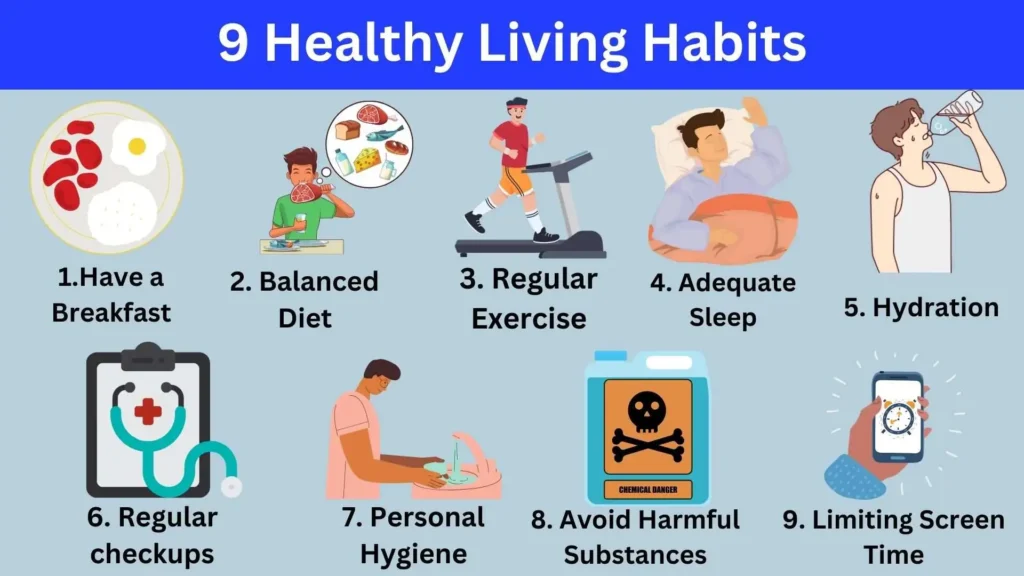Being healthy and fit isn’t just a trend; it’s a way of life. A healthy lifestyle leads to happiness, stability, and success.
Living a healthy life is a conscious choice, and one of the most impactful decisions you can make is to develop good habits for healthy living.
With today’s demanding schedules and rising expenditures, it can be difficult to maintain a healthy lifestyle. But here’s the secret: when you nail it, the rewards are well worth the effort.
Table of Contents
9 Healthy Habits for Living
Let’s have a look at the 9 habits for healthy living.

1. Have a Breakfast
You’ve probably heard the quote of – A.A. Gill: “Breakfast is everything. The beginning, the first thing. It is the mouthful that is the commitment to a new day, a continuing life.” this highlights the significance of breakfast in our daily lives.
Having breakfast means consuming your first meal within a few hours of waking up. This meal provides essential nutrients and energy to start your day right. It typically includes a balance of carbohydrates, proteins, and fats to fuel your body and mind.
Studies show that habitual breakfast has positive effects on the behavior, cognitive, and academic performance of children and adolescents.
Habitual breakfast has several benefits:
- Boost metabolism
- Enhance cognitive functions
- Maintain blood sugar level
- Support weight management
- Improve mood.
Tips for a Healthy Breakfast Routine
- Plan Ahead: Prepare ingredients the night before to save time in the morning.
- Keep It Balanced: Include a mix of proteins, fats, and carbohydrates in your meal.
- Stay Hydrated: Don’t forget to drink water or include a healthy beverage like herbal tea or milk.
- Avoid Sugary Foods: Limit intake of sugary cereals or pastries that can lead to energy crashes.
2. Balanced Diet
A balanced diet involves consuming a variety of foods in the right proportions to provide your body with essential nutrients. This includes a mix of carbohydrates, proteins, fats, vitamins, and minerals.
Adopting a balanced diet is one of several healthy habits for living that can significantly improve your quality of life. You can adopt it by developing healthy eating habits.
A balanced diet not only fuels your body but also aids in maintaining optimal health and preventing chronic diseases.
As timeless adage by nutritionist Victor Lindlahr goes, “You are what you eat.” underscores the profound impact our diet has on our overall health. In a Harvard study, researchers identified the 5 healthy habits, in which maintaining a healthy diet was recognized as a key factor to living a longer, healthier life.
In this study, a healthy diet was calculated and graded based on regular meal reports. These foods included vegetables, fruits, nuts, whole grains, healthy fats, and omega-3 fatty acids.
How to Maintain a Balanced Diet
- Plan Your Meals: Plan your meals ahead of time to ensure they include a variety of food groups.
- Portion Control: Be mindful of portion sizes to avoid overeating.
- Limit Processed Foods: Minimize the intake of processed and sugary foods.
- Include a Rainbow of Fruits and Vegetables: Aim to include different colored fruits and vegetables to ensure a range of nutrients.
3. Regular Exercise
Regular exercise is not just about sculpting the perfect physique; it’s about nurturing your body, mind, and soul. It’s a multifaceted approach to health that goes beyond the physical benefits.
Regular exercise encompasses a wide range of physical activities, from brisk walking and cycling to weightlifting and yoga. It’s about moving your body in ways that challenge and strengthen your muscles, elevate your heart rate, and improve your flexibility and endurance.
When you engage in regular physical activity, you’re not just burning calories; you’re boosting your mood, sharpening your focus, and enhancing your well-being.
Tips for Making Exercise a Habit
- Set Realistic Goals: Start small and gradually increase the intensity and duration of your workouts.
- Find Activities You Enjoy: Experiment with different forms of exercise, from yoga and cycling to dancing and swimming, until you find what brings you joy.
- Schedule It In: Treat exercise like any other important appointment, and block out dedicated time for it in your calendar.
- Make It Social: Invite friends or family to join you for workouts or participate in group classes or sports leagues.
- Stay Consistent: Consistency is key to reaping the benefits of regular exercise. Aim for at least 30 minutes of moderate-intensity activity most days of the week.
4. Adequate Sleep
“Sleep is the best meditation.” Dalai Lama
Adequate sleep refers to getting the right amount of sleep that your body needs to function optimally. It involves both quantity and quality—ensuring you not only sleep enough hours but also achieve restful and restorative sleep.
Healthy sleep habits are crucial for numerous aspects of health:
- Sleep helps repair tissues, build muscle, and strengthen the immune system.
- Quality sleep is vital for brain function, impacting mood, cognitive abilities, and emotional stability.
- Sleep influences hormones that control hunger and appetite
Every individual is different. But in general, adults require 7 to 9 hours of sleep every night. Infants typically sleep for sixteen hours every day, while young children require ten hours or more.
Tips for Better Sleep
- Create a Sleep Schedule: Stick to a consistent bedtime and wake-up time, even on weekends.
- Optimize Your Sleep Environment: Keep your bedroom cool, dark, and quiet. Invest in a comfortable mattress and pillows.
- Limit Exposure to Screens: Avoid screens from phones, tablets, and computers at least an hour before bed.
- Establish a Bedtime Routine: Engage in relaxing activities like reading, taking a warm bath, or meditating before bed.
- Watch Your Diet: Avoid heavy meals, caffeine, and alcohol close to bedtime.
5. Hydration
Hydration refers to the process of maintaining adequate fluid levels in the body. Studies show that water constitutes about 60% of the adult human body, making it crucial for nearly every bodily function.
Water acts as a solvent for biochemical reactions within cells, helps transport nutrients, and aids in the elimination of waste products.
Adequate hydration is a healthy living habit that helps maintain energy levels by facilitating efficient metabolic processes. Dehydration can lead to fatigue and decreased physical performance.
Water aids in digestion, nutrient absorption, and circulation. It regulates body temperature, lubricates joints, and removes waste products. Essentially, water is involved in every cellular function, making hydration indispensable for health. As W.H. Auden says,
“Thousands have lived without love, not one without water.”
Proper hydration is linked to improved concentration, cognitive function, and mental clarity. Even mild dehydration can impair brain function and mood.
How to Stay Hydrated
- Drink water Regularly: Aim to drink at least 8 cups (2 liters) of water a day, more if you are physically active or in hot climates.
- Eat Hydrating Foods: Include water-rich foods in your diet, like cucumbers, watermelons, oranges, and strawberries.
- Carry a Water Bottle: Keep a reusable water bottle with you to remind yourself to drink water throughout the day.
- Flavor Your Water: If plain water doesn’t appeal to you, add a slice of lemon, cucumber, or a few berries to enhance its taste.
- Monitor Your Hydration: Pay attention to signs of dehydration like dark urine, dry mouth, and dizziness.
6. Regular Checkups
Regular health checkups are more than just routine visits to the doctor; they are a proactive approach to maintaining your health, as Benjamin Franklin has said.
“An ounce of prevention is worth a pound of cure.”
Regular health checkups are important preventive habits. They are scheduled medical examinations and tests performed by healthcare professionals to monitor your overall health, identify any potential issues early, and manage existing conditions.
Incorporating regular health checkups into your routine is one of the best habits for healthy living. These checkups typically include blood tests, physical exams, screenings, and discussions about lifestyle choices and health concerns.
Tips for Incorporating Regular Health Checkups
- Schedule checkups: Mark your calendar for checkups with your primary care physician.
- Keep a Health Diary: Track any symptoms or health changes to discuss with your doctor during visits.
- Stay Informed: Be aware of the recommended screenings and vaccines for your age and health status.
- Ask Questions: Prepare a list of questions or concerns to address with your healthcare provider.
- Follow-up: Make sure to follow up on any additional tests or referrals recommended by your doctor.
7. Personal Hygiene
Personal hygiene is more than just a routine; it’s a series of healthy habits for living that ensure not only our health but also the health of those around us.
By prioritizing personal hygiene, you are investing in your most valuable asset: your health.
As the famous writer Ralph Waldo Emerson said, “The first wealth is health.”
Imagine waking up in the morning feeling fresh and energized. You head to the bathroom, brush your teeth, wash your face, and take a shower. Each step in your morning routine is a building block towards a healthier, happier you.
These simple acts of cleanliness do more than just keep you looking good—they protect you from illnesses, enhance your mental well-being, and boost your self-confidence.
How to Maintain Good Personal Hygiene
- Bathe Regularly: Aim to shower or bathe daily to remove dirt, sweat, and bacteria from your skin.
- Wash Your Hands: Regular hand washing with soap and water is crucial, especially before eating, after using the restroom, and after touching potentially contaminated surfaces.
- Brush and Floss Daily: Maintain oral hygiene by brushing your teeth at least twice a day and flossing daily.
- Trim your Nails: Keep your nails short and clean to stop nail biting and the buildup of dirt and bacteria.
- Wear Clean Clothes: Change into clean clothes daily and wash your clothes regularly to prevent the buildup of sweat and bacteria.
8. Avoid Harmful Substances
Imagine waking up each day with a clear mind, a body free from toxins, and a spirit that feels energized.
By avoiding harmful substances like tobacco, excessive alcohol, illegal drugs, processed food, etc., you are not only protecting your physical health but also nurturing your mental and emotional well-being. It’s the best habit for healthy living, providing a strong foundation for other healthy living habits to thrive.
As the legendary Greek physician Hippocrates once said, “Let food be thy medicine and medicine be thy food.”
By avoiding harmful substances, you are essentially choosing to nourish your body with what it truly needs, paving the way for a life of vitality and health.
Tips to Avoid Harmful Substances
- Educate Yourself: Knowledge is power. Understand the effects of harmful substances and the benefits of avoiding them.
- Seek Support: If you’re struggling with addiction or substance use, seek support from friends, family, or professional services.
- Find Healthy Alternatives: Replace harmful substances with healthier options. For instance, swap processed snacks for fresh fruits and vegetables.
- Set Clear Goals: Establish clear, achievable goals for reducing or eliminating harmful substances from your life.
- Practice Self-care: Engage in activities that promote well-being, such as exercise, meditation, and hobbies you enjoy.
9. Limiting Screen Time
Adopting healthy social media habits, including limiting screen time, is essential for maintaining healthy living. Imagine a day where you feel more connected to the world around you, less stressed, and more productive. Limiting screen time can help you achieve this.
Excessive screen time, especially spent on social media, is linked to various health issues, including eye strain, poor posture, and disrupted sleep patterns. It also impacts mental health, leading to anxiety and depression.
By developing healthy phone habits, such as setting time limits and being mindful of content consumption, you can overcome these risks and promote overall well-being.
How to Limit Screen Time
- Set Boundaries: Establish specific times during the day when screens are off-limits, such as during meals or before bedtime.
- Use Screen Time Tracking Apps: Utilize apps that track your screen time.
- Create Screen-Free Zones: Designate certain areas in your home, such as the bedroom or dining area, as screen-free zones to encourage offline activities.
- Engage in Offline Hobbies: Rediscover hobbies and activities that don’t involve screens, such as reading, gardening, or crafting.
Conclusion
The journey to better health is not about perfection but about consistent, positive changes that accumulate over time. By integrating these good habits for healthy living into your lifestyle, you pave the way for a healthier, happier future.
Your commitment to these healthy habits is an investment in yourself, ensuring that you not only live longer but also live better.
Start now and experience the transformative power of good habits for healthy living. Your future self will thank you.
FAQs
How can I stay motivated to maintain healthy living habits over the long term?
Staying motivated can be challenging, but setting realistic goals, tracking your progress, rewarding yourself for milestones, and finding a support system can help maintain your enthusiasm and commitment.
What role does nutrition play in stress management?
A balanced diet rich in fruits, vegetables, whole grains, and lean proteins can help stabilize mood, provide sustained energy, and improve overall mental health, aiding in better stress management.




